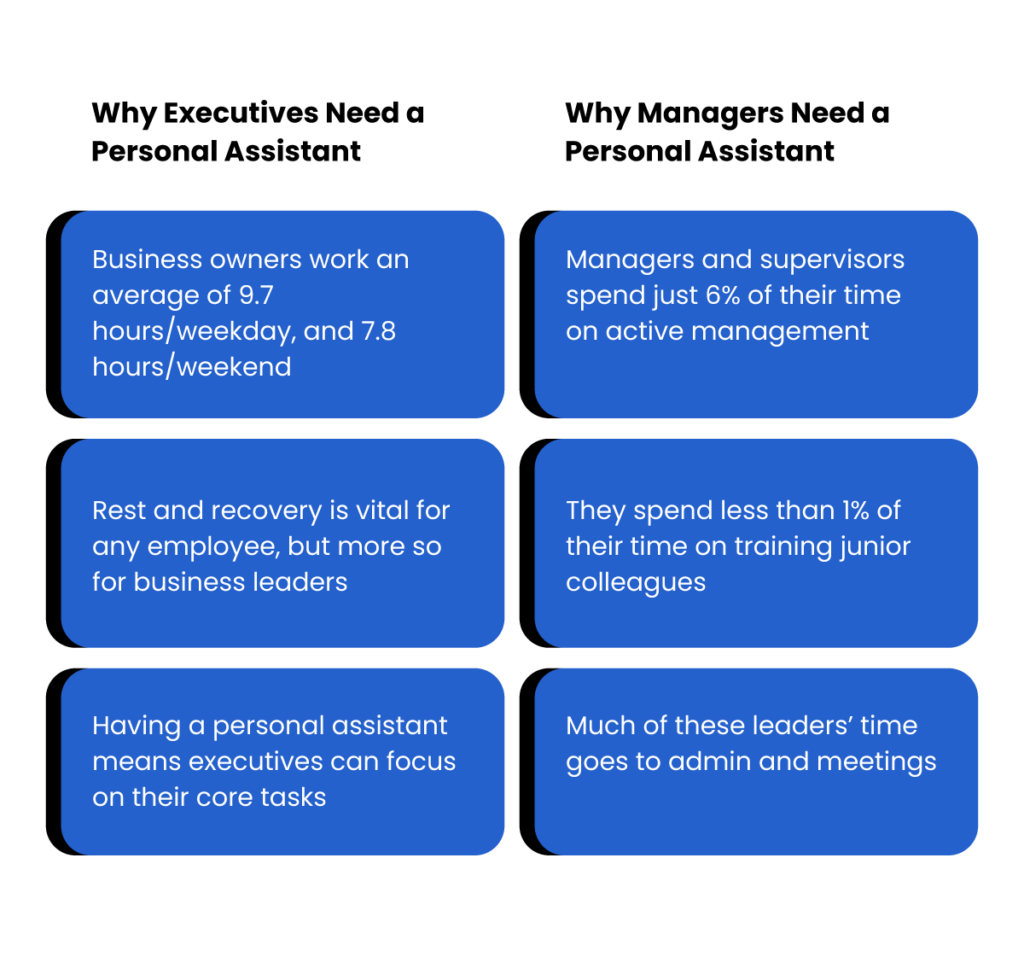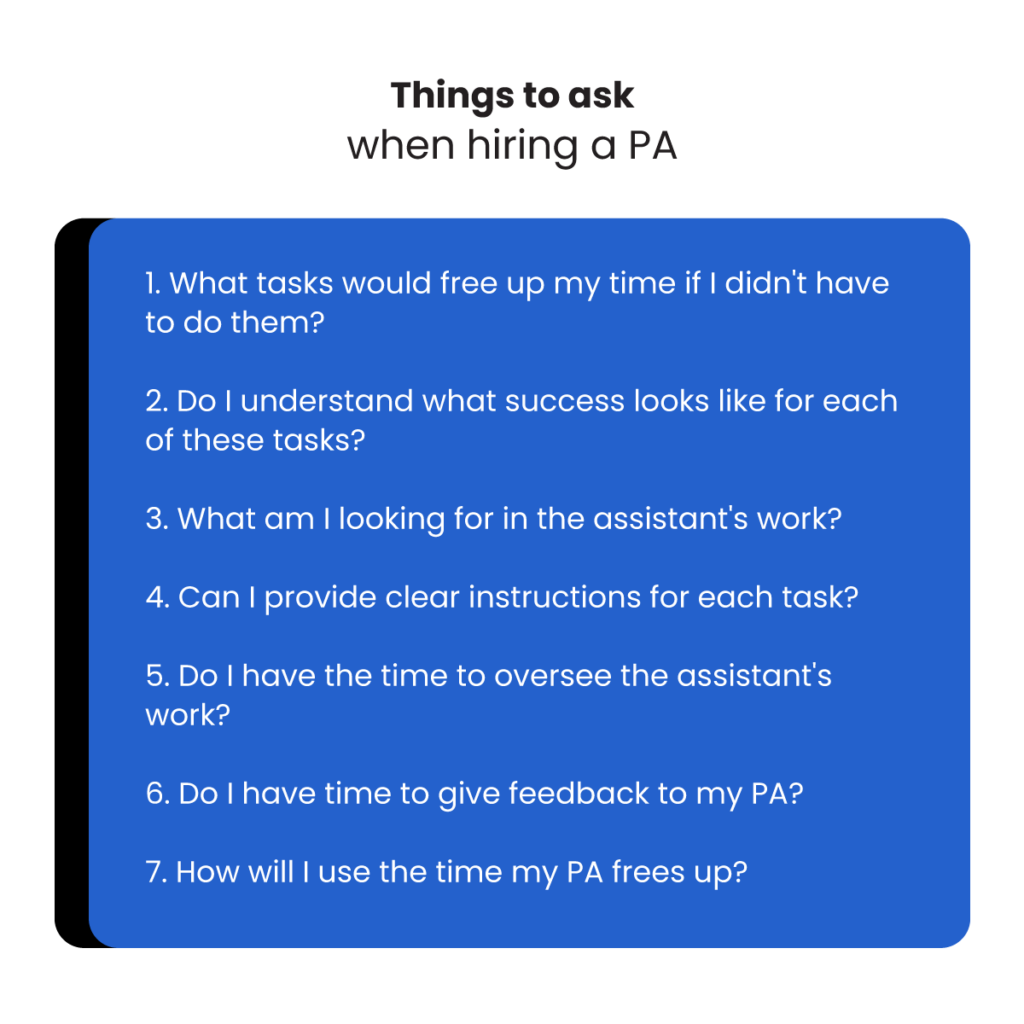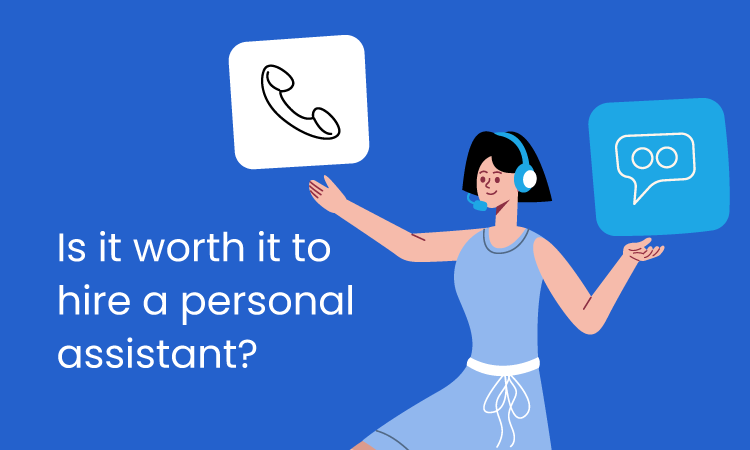Small business owners and managers have a lot of things on their plates. Whether part of a startup or an established enterprise, this group is often responsible for everything from marketing and sales to operations and finance. Often, this leaves them with little room for non-work-related things. Hiring a remote personal assistant can help with the workload, but since business leaders are A-types, most of them would hesitate and ask, “do I need a personal assistant?”
So, do they really need personal assistants? Here are questions to ask yourself when deciding whether or not to hire help.
Business Owner: Do I Need a Personal Assistant?
A while back, the Harvard Business Review conducted a large survey on how executives like CEOs spent their work days. The article showed that for the core management of a company, the work never seems to let up.
Business owners and leaders are always on, working an average of 9.7 hours/weekday, and 3.9 hours/weekend day. They even log in an average of 2.4 hours when they’re on vacation! Keep in mind that this is an article published in 2018, referencing a study that was launched in 2006. So, the figures have likely changed, especially in light of the COVID-19 pandemic.
But even when they spend so much time at work, CEOs and other business leaders might feel like they’re still behind in their tasks, and there’s still so much to do. It’s because various stakeholders and departments would like to speak with leaders, and they have to balance out others’ needs with their agenda, not to mention “have-to-do” tasks.
Have-to-do tasks are, essentially, the mundane and tedious administrative tasks that CEOs and managers need to take care of. This includes approving invoices and documents, reading reports, attending meetings, and responding to emails. While these might not be the most exciting things to do, they’re essential for keeping the business running smoothly.
Ideally, business owners would have someone to take care of these have-to-do tasks for them, so they can focus on more important things. That’s where a personal assistant comes in! A good PA will help with both the big and small tasks, from scheduling appointments to booking travel plans.

Balancing Out an Executive’s Workday
Everyone wants work-life balance, from entry-level employees to the top executives of a company. But giving equal importance to work and personal commitments starts with the individual. The person himself should know how much time to spend on recreation, socializing, and personal care. For instance:
- A study by the Journal of Organizational and Occupational Psychology shows that non-work-related creativity (e.g. playing an instrument or writing) affected performance outcomes. Simply put, people who pursued hobbies after their 9-5 ended up being more creative and willing to go above and beyond for work.
- People who spend time with friends and family to unwind experience the positive effects of what psychologists call the “buffering effect.” That is, their support system cushions the blow of work-related stress.
- Staying after hours every day does not always translate to better outcomes. For example, employee productivity falls after working >50 hours/week.
- Long hours at the office mean less time for other things, including catching up on z’s. And it’s a well-known fact that sleep deprivation is one of the worst killers of productivity.
Having a personal assistant frees up time for C-suite execs. Assistants take the “have-to-do” tasks off a business leader’s plate, letting them focus on strategy and networking while still freeing up time for other passions and social activities. Having work-life balance is important for all employees, but it is even more so for the business’ leaders, the ones who steer the ship.
Manager: Do I Need a Personal Assistant?
C-suite executives aren’t the only ones who need personal assistants–middle managers or supervisors may need them as well. In a study on UK managers and supervisors, researchers shared that this cohort spends less than 1 hour/day managing people. They found that:
- Managers and supervisors think that around 26% of their time is spent on active management, when in fact, it’s just about 6%
- They’re spending 19% of their time on admin tasks, more than they’d prefer, and are not devoting enough time to training at all (less than 1%)
- Much of these leaders’ time goes to admin, meetings, and manually managing employees (i.e. taking on their assigned tasks)
By and large, managers are supposed to help entry-level and junior employees develop into valuable members of the organization, but they don’t have enough time to do that. This is not a problem unique to the UK–it occurs worldwide.
Helping Managers Own Their Time
Having a personal assistant lets managers focus on the more important parts of their role. PAs handle admin tasks for the home and the workplace, and managers can delegate most of their admin work to a PA.
In terms of managing support, PAs can:
- Take meeting minutes so the manager can focus on leading the discussion
- Help with performance reviews by conducting research and writing up summaries
- Assist with training by handling logistics and scheduling
- Order supplies/equipment for the office
- Monitor office supplies and replenishing/replacing as needed
Personal assistants are an important part of any business, but they’re especially crucial for managers. This is because they take on the time-consuming tasks that managers would otherwise have to do themselves.
Comparing In-Person and Remote Personal Assistants
While both in-house personal assistants and remote personal assistants offer valuable support to their clients, there are some key differences between the two roles.
The most obvious distinction is their physical presence. In-house personal assistants work alongside their clients, allowing them to handle tasks like shopping at physical stores and making reservations at restaurants.. On the other hand, remote personal assistants, also known as virtual assistants, perform these tasks and more, but from a remote location.
Another important difference is their employment arrangement. Personal assistants are usually hired directly by their clients and receive a regular salary or hourly wage. In contrast, virtual assistants typically operate as independent contractors and are compensated per project or task.
Lastly, personal assistants often oversee a team of subordinate assistants, while virtual assistant services are usually structured with one VA dedicated to one client.
Pros of Hiring a Remote Personal Assistant
Virtual personal assistants, or VAs, are gaining popularity in corporate culture, offering support to businesses of all sizes. Here are the advantages of having a remote personal assistant:
Flexible Working Hours
Virtual personal assistants can align their working hours with your needs, even accommodating clients in different time zones. Full-time VAs can work during your clients’ business hours, ensuring immediate assistance and prompt responses. Alternatively, flexible arrangements allow VAs to adapt their schedules to meet your demands.
Constant Skill Enhancement
VAs are motivated to enhance their skills and often pursue certifications and professional development. They expand their expertise beyond general assistance, acquiring specialized knowledge in areas such as content marketing, graphic design, and social media management. This ongoing upskilling enables them to provide comprehensive support and become a valuable asset to your business.
Cost Effectiveness
Hiring a virtual assistant is cost-effective as they only bill for hours worked. Even with full-time arrangements, VAs are more affordable than hiring an in-house employee for the same workload. Additionally, you save on workplace costs, as VAs work remotely and don’t require office space, equipment, or software.
Versatile Support
Virtual personal assistants go beyond administrative tasks. They can handle personal errands remotely, from scheduling appointments and making reservations to tracking fitness goals and online gift shopping. While some tasks are better suited for in-person assistants, VAs offer a broad range of services, including social media marketing, lead generation, and website design.
Independent Work
Virtual PAs are self-starters who can complete tasks without constant supervision. Once you provide instructions and brief them on your processes, they troubleshoot and complete assignments independently. Managed service providers offer additional support, ensuring continuity even if your assigned personal assistant is unavailable.
Cons of Hiring a Remote Personal Assistant
There are many reasons why you should hire a remote assistant. But like in any business decision, there are also drawbacks to doing so:
Perceived Length of Onboarding
While virtual PAs are independent, it’s essential to orient them to your office procedures and communicate your needs and goals. The level of detail in your brief or initial input impacts their output quality. As they become more familiar with your company, their efficiency and output will improve.
For some business owners, this might be a disadvantage. They might not have time to introduce their processes to a remote assistant. In this case, hiring a managed VA from Wing is a good option. Wing assistants undergo intensive training before getting matched with a client, ensuring that they can fit in seamlessly with existing procedures.
Building Rapport Takes Time
Establishing rapport is crucial for successful collaboration, even in a remote working setup. While working with a virtual personal assistant, building a strong relationship may take longer due to the absence of in-person interactions.
Do I Need a Personal Assistant? Things to Ask
Personal assistants are an important asset for any business leader. They provide much-needed support so that executives and managers can focus on more important tasks. If you’re thinking of getting a PA, here are things to consider.

Do I Know What to Delegate?
As a manager or executive, it’s important to know what tasks you can delegate to a personal assistant. You need to understand what “success” looks like when performing these tasks, and what you’ll be looking for in the assistant’s work. Here are some questions to ask yourself:
- What tasks would free up my time if I didn’t have to do them?
- Do I understand what success looks like for each of these tasks?
- What am I looking for in the assistant’s work?
- Can I provide clear instructions for each task?
- Do I have the time to oversee the assistant’s work?
If you can answer these questions, then you’re ready to start delegating tasks to a personal assistant. Remember, it’s important to provide clear instructions and expectations for each task. And, you should always be available to answer any questions or provide feedback on the work.
Can I Train Another Person to Do These Tasks?
It is important to remember that not all tasks can be delegated. For example, if you are responsible for managing a team of people, you cannot delegate that responsibility to your assistant.
You also need to consider the type of tasks that you’re delegating. Some tasks may require specific knowledge or skills that your assistant may not have. In these cases, you’ll need to provide training for your assistant so they can perform the task correctly.
Finally, you should always remember the impact that delegating a task will have on your business. For example, if you’re delegating marketing tasks to your assistant, make sure that they understand what good marketing would do for your company, and what a successful marketing campaign looks like.
How Will I Use The Time an Assistant Frees Up?
Now that you know what freeing up time would mean for you, it’s time to consider how you’ll use the time an assistant frees up.
Think about how you want to spend your time, and how that will contribute to either your organization or your personal growth. For example, if you’re a manager, you may want to use your free time to focus on developing your team. Or, if you’re an entrepreneur, you may want to use the free time to work on your business plan or meet with potential investors.
No matter how you choose to spend your time, remember that an assistant can help you free up time so you can focus on the things that are most important to you.
How Do I Measure My Assistant’s Performance?
Once you’ve delegated tasks to your assistant, it’s important to establish a system for measuring their performance. This will help you ensure that they are meeting your expectations and that the work is getting done correctly.
There are several ways to measure an assistant’s performance. One way is to set up a regular meeting to discuss their progress on tasks. Another way is to keep track of metrics related to the tasks they are performing. For example, if they are responsible for managing your calendar, you can track the number of meetings they’ve scheduled or the number of events they’ve successfully coordinated.
Whatever method you choose, it’s important to be consistent in your measurement of an assistant’s performance. This will help you identify any areas where they need improvement, and it will also help you recognize their successes.
When it comes to feedback, personal assistants are just like any other employee – they need to know what they’re doing well and where they can improve. Feedback should be given regularly, and it should be specific, objective, and actionable.
Do I Need a Personal Assistant? Chances Are, Yes
If you’re a busy executive or manager, chances are you need a personal assistant. Personal assistants can help you free up time so you can focus on more important tasks, and they can provide much-needed support in the office.
PAs are especially helpful for busy executives. CEOs often have a lot of demands on their time, and PAs can help by taking care of tedious tasks or handling logistics for events. Managers may also find PAs helpful in managing their teams. PAs can do things like take meeting minutes, write performance reviews, or assist with training.
Whether you’re an executive or a supervisor, hiring a Wing personal assistant should help you streamline your schedule. Speak with Sales and let’s get you doing more of what matters to you!
Aya is Wing Assistant’s blog manager. When she’s not wrangling content briefs, editing article drafts and handling on-page SEO, she is crafting messages for Wing’s other communication materials. Aya writes about SaaS startups, marketing for startups, search engine optimization, and pop culture.






